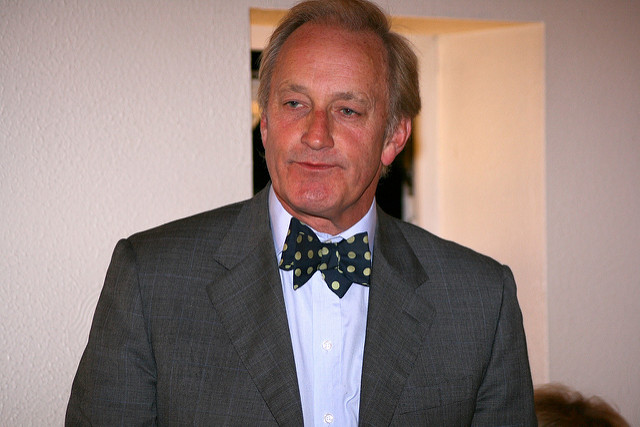Predicting the 2020 election? We are not even sure if the results of 2015 are going to change.
Last Thursday, the UK went to the polls. While different parts of the country voted in different elections for posts of varying significance, political observers could draw conclusions from a wide and varied set of results. Here, Alun Wyburn-Powell gives his take on proceedings, and on the news that the Conservatives may be forced to re-win seats that they won at the 2015 General Election.

He’s back (Credit: Euro Realist Newsletter, CC BY SA 2.0)
5 May 2016 was a day of extraordinary political headlines. ‘Conservatives take a seat from Labour in Glasgow’. ‘Lib Dems win two seats from the SNP’. ‘Disgraced former Conservative MP Neil Hamilton is elected for UKIP in Wales’. ‘Labour wins the London mayoral election after Conservative campaign backfires’. ‘A party which had a Jewish leader until last year is criticised as antisemitic’.
The temptation is to ask what this tells us about the next general election. All other things being equal, it says that Labour will probably not win the 2020 general election. But, all other things will not be equal. By then we will have had the EU referendum and at least one change of party leader – maybe more. Did voters or commentators in 1912, 1929, 1935 or 1981 have any idea what was going to happen at the next election? To focus on an unknowable event four years hence is to miss out on a fascinating prospect in the meantime.
What do the results from around the country and from a variety of types of election tell us about the situation now?
The election for London mayor may tell us quite a lot. One credible and interesting candidate from a minority religious background was completely hobbled by a ham-fisted negative campaign from his own party’s advisors, while another credible and interesting candidate from a minority religious background won the race, despite general media hostility. It shows that a hostile press does not carry as much weight as it likes to think it does. It probably marks the end of Sir Lynton Crosby’s firm’s meddling in British politics and a move away from vicious negative campaigning. Tactics which worked in Smethwick in 1964, do not work in London in 2016. In most trends, where London leads, the rest of the UK follows.
The Scottish Parliament election tells us something else. The top three parties were all led by women. The Conservative Party is not dead in Scotland. While Wales tends to follow English ups and downs, Scotland tends to move seismically, and not swing back. The Liberals dominated Scotland up to 1910. The Conservatives held the most seats in Scotland on and off until 1955. Labour then took over and dominated Scottish politics until their eclipse by the SNP. The Greens may be looking to take their turn next. Despite their fall from dominance, the Liberal Democrats, Conservatives and Labour Party in Scotland are not dead yet.
Parties are being created at a faster rate than they are dying. Voters are getting more choice – an average of six candidates per seat in a general election. In a crowded field, personalities stand out better. Identikit candidates get lost in the noise. One consequence of the growing number of parties is that no party attempts to win anything like half the vote any more. All can appeal to minorities and ignore large swathes of the electorate. Tony Blair managed a majority on only 35% of the vote in 2005 and David Cameron managed one with 37% in 2015.
This means that, on average, leaders and parties are less popular than they used to be. Usually at least 60% of the electorate is not supporting any particular leader or party. Social media amplifies the apparent level of discontent, creating an impression that current leaders are not up to the quality of past leaders. This is generally not true, but it does mean that personalities are becoming more important than policies – hence the prominence of Boris Johnson, Nigel Farage, Beppe Grillo and Donald Trump. With greater choice, voters need to be able to pick out someone different, especially when there is so much overlap between parties’ policies.
The results also tend to contradict the old idea that split parties do not do well in elections. Sadiq Khan did not exactly collaborate with Jeremy Corbyn in the mayoral contest, but he won. The Conservatives are not exactly seeing eye to eye over Europe. David Cameron did not win the Conservatives’ new seats in Scotland – that was Ruth Davidson’s achievement. Perhaps we are moving beyond the capacity for any one leader to be able to succeed in campaigns in London, rural England, urban England, Wales and Scotland. The voting systems are different and in Northern Ireland even the parties are different.
The opinion polls, warily regarded after 2015, called most of the 5 May results correctly. However, they generally overstated the SNP’s prospective vote and understated the Conservatives’. The next big test for the pollsters will be the EU referendum. At the moment the poll of polls shows a 50/50 Remain/Leave split. This alone does not tell us which side is likely to win, so the opinion polls are of little help. The oscillations in the poll of poll total tend to be accounted for more by whether the most recent polls were conducted by phone (generally showing a Remain lead) or on-line (showing a slim advantage to Leave). The pollsters do not routinely include voters in Northern Ireland, Gibraltar or overseas voters eligible to vote in the referendum if they have been on the UK electoral roll in the last 15 years. So we have no sure guide to the outcome of the next critical event.
But, before we gaze too far into the foggy future, let’s make sure of the past. Economists are mocked for their inability to forecast: ‘What is your prediction for the economy for next year?’ ‘I don’t know about next year; I am having enough trouble forecasting last year!’ is a well-worn joke at the expense of economists. Political commentators are not necessarily much more prescient. Channel 4 News research of Conservative election expenses in the 2015 general election, which are now subject to police investigations, may lead to a re-run of some of last year’s election contests. At least ten Conservative-held constituencies are to be investigated – and the government only has a majority of 12 seats. If these marginal contests are re-run, will the other parties stand aside to let the best-placed challenger have a clear run? Neil Hamilton, newly-elected AM in Wales, may have some memories of something like this happening in Tatton in 1997.
—
This post represents the views of the author, and not those of Democratic Audit or the LSE. Please read our comments policy before posting.
—
 Dr Alun Wyburn-Powell is the author of a biography of William Wedgwood Benn, first Viscount Stansgate. He can be found on Twitter @liberalhistory and writes a blog.
Dr Alun Wyburn-Powell is the author of a biography of William Wedgwood Benn, first Viscount Stansgate. He can be found on Twitter @liberalhistory and writes a blog.





 Democratic Audit's core funding is provided by the Joseph Rowntree Charitable Trust. Additional funding is provided by the London School of Economics.
Democratic Audit's core funding is provided by the Joseph Rowntree Charitable Trust. Additional funding is provided by the London School of Economics.
Predicting the 2020 election? We really are not even sure if the results of 2015 are going to change. https://t.co/wl4T4FhG8D
What did the results of the ‘something for everyone’ elections on May 5th actually tell us about UK politics? https://t.co/wl4T4FhG8D
Important reminder from @liberalhistory – tho in present circs GE2020 predictable, lots will have changed by then.
https://t.co/iFG9BHvX0d
Forget about predicting the 2020 election. We are not even sure if the results of 2015 are going to change. https://t.co/wl4T4FhG8D
[…] This post originally appeared on the Democratic Audit blog. […]
Forget predicting the 2020 election, we still don’t know who won in 2015. https://t.co/8MKSqlXaKz
Predicting the 2020 election? We are not even sure if the results of 2015 are going to change https://t.co/s63KZu4feg
Predicting the 2020 election? We are not even sure if the results of 2015 are going to change. https://t.co/4qTHDwwNT2
Predicting the 2020 election? We are not even sure if the results of 2015 are going to change. https://t.co/w6z4ccMhOb
Predicting the 2020 election? We are not even sure if the results of 2015 are going to change. https://t.co/LzSvWJHFy6
Forget about predicting the 2020 election. We are not even sure if some of the 2015 results may be changed. https://t.co/wl4T4FhG8D
Predicting the 2020 election? We are not even sure if the results of 2015 are going to change. https://t.co/e9MQEV6AqS
Predicting the 2020 election? We are not even sure if the results of 2015 are going to change. https://t.co/wl4T4FhG8D
What do Thursday’s results tell us about #PGE2020? Not a lot, says @liberalhistory in today’s @democraticaudit blog: https://t.co/z8RMitDr7O
Predicting the 2020 election? We are not even sure if the results of 2015 are going… https://t.co/MyPJf7NifS https://t.co/PMnT17fMK4